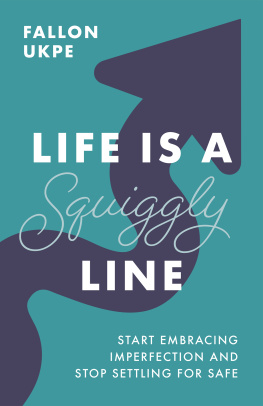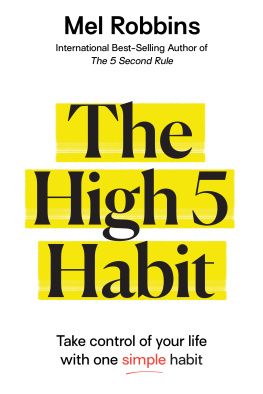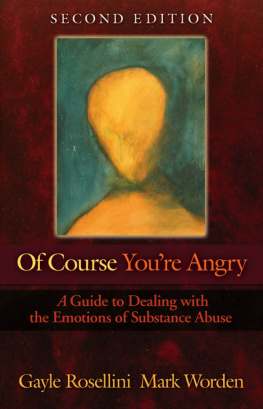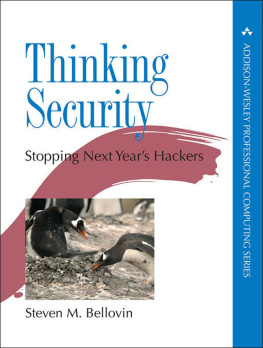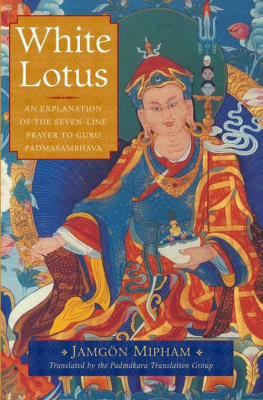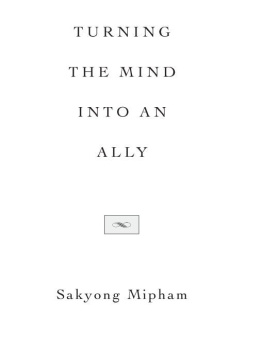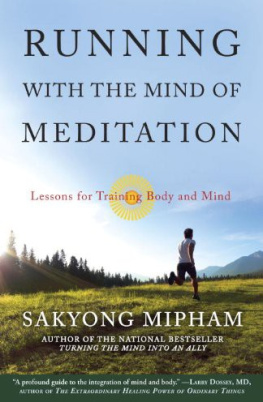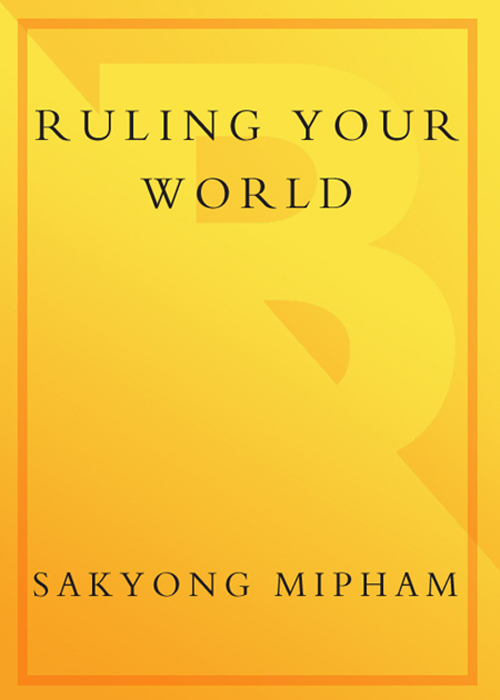
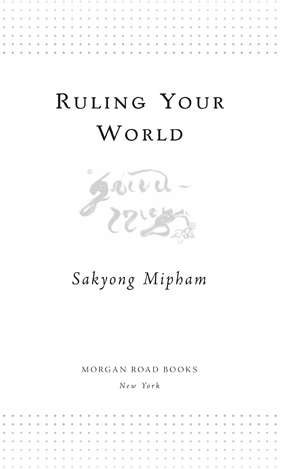
Contents
To my father,
the first Sakyong,
and
to my teachers,
His Holiness Dilgo Khyentse Rinpoche
and
His Holiness Drupwang Pema Norbu Rinpoche,
for empowering the Sakyong lineage
Introduction
Bringing heaven down to earth, into our daily life, is how we rule our world.
R ECENTLY I VISITED my friends Adam and Allie, the parents of two-year-old Javin. I asked them how parenthood was going, and they replied that what impressed them most was that Javin seemed to know things naturally. They said, We didnt teach himnobody did. Its got to have come from somewhere. As human beings, we are so wise. Our minds are vast and profound. In the teachings on rulership, this innate wisdom is known as basic goodness. It is the natural, clear, uncluttered state of our being. We are all appointed with heavengreat openness and brilliance. Bringing this heaven down to earth, into our daily life, is how we rule our world.
Dawa Sangpo, the first king of the ancient Himalayan kingdom of Shambhala, once supplicated the Buddha for spiritual guidance. He said, Im a king. I have a palace, a family, ministers, subjects, an army, and a treasury. I want to realize enlightenment, but I cannot abandon my responsibilities to pursue spiritual practice in a monastery. Please teach me how to use life in the world to become enlightened.
The Buddha assured the king that he would not have to become an ascetic or a monk in order to attain enlightenment. Indeed, he could practice a spiritual path while fulfilling his many responsibilities. He could become a sakyonga ruler who rules by balancing heaven and earth. Heaven is wisdom. Earth is nitty-gritty experience. When we begin to mix wisdom into our secular life, we have successboth spiritual and worldly. The Buddha said to the king, Dont be biased. Look at the land and look at your people. If you can develop certainty in the indestructible basic goodness that lies at the heart of everything, then you can rule your world. But becoming a sakyong is a challenging path, since life in the world is full of decisions to make, as well as endless distractions. Taking these instructions to heart, King Dawa Sangpo developed certainty in the view of basic goodness. This vision transformed his kingdom, for it brought inspiration and meaning to peoples lives.
My father, the Vidyadhara Chgyam Trungpa Rinpochewho was born a monk and died a sakyongled three hundred people out of Tibet in 1959, with the Chinese Communists on their heels. They climbed mountain after mountain, often through deep snow and bitter cold. They ran out of food, so they boiled and ate their yak-skin bags. Some people in the group died; some were captured by the Chinese. They lost many of their possessions, including a thousand-page manuscript on the Shambhala teachings that Rinpoche had written, which was swallowed by a river. According to my mother, in spite of the suffering, they were always cheerful. Finally they crossed the border into India. After enduring many more hardships, Rinpoche eventually came to the West, where he introduced these teachings.
In raising me, my father applied the traditional guidelines that the Buddha had established in his instructions to Dawa Sangpo, continuing the Shambhala lineage of the bodhisattva-warrior and the enlightened ruler. This is a lineage of fearlessness: we are not afraid of our own power to unite heaven and earth. Certain teachings are made for certain times. The Shambhala teachings have appeared in the West at this particular time to pacify aggression, which obstructs our ability to love and care for one another. Aggression produces fear. Fear produces cowardice; we are afraid even of our own thoughts and are therefore ruled by them. The teachings of Shambhala tell us how to establish peace and confidence. In the potential to discover basic goodness and to bring forth wisdom and compassion in our daily life, we all have what we need to become a sakyonga Tibetan word that means earth-protector. What we are protecting is the earth of our innate sanity.
If ruling our world stems from developing certainty in our sanity, how do we discover it? The Shambhala teachings instruct us to put our mind of fearfulness in the cradle of loving-kindness. The most loving environment we can create is on the meditation seat. My father taught me to meditate when I was a child. At the beginning, this meant simply taking time out of my day to reflect on my feelings. Then I learned to stabilize my mind by placing it on the breath. When I had accomplished the precision of this technique, he told me to contemplate impermanence, suffering, karma, selflessness, and compassion. When I was about twelve, he instructed me to meditate and contemplate for one hour a day. He later increased the sessions to two hours. At times I meditated for several days, and eventually for weeks and even months. Since meditation was to be the mainstay of my future vocation, I had the time to do it this way.
When I was a teenager, I explained to my father that I wanted to go camping alone in the wilderness. After pondering it for a few days, he said that this would be a good time. As a parent, he was proud that I wanted to explore the world on my own, and he was concerned about my safety. He wanted to make sure I could carry a heavy backpack, so after loading me up, he had me run up and down the stairs a few times. Having satisfied his concerns, off I went, feeling exuberant.
I hiked for about a week, rarely seeing anyone and encountering all kinds of foul weatherwind, rain, hail. I felt surprisingly happy. Having grown up in situations where there were many people around, I had always been tutored, fed, and served. Feeling alone helped me appreciate what others had done for me, and I also began to discover my own strength as a Shambhala warrior on my way to becoming a ruler. Nature was an excellent teacher, never giving an inch. If I wanted to eat, I had to make a meal; if I wanted to sleep, I had to think ahead and find an appropriate camping spot.
Upon my return, people were relieved, excited, and proud. Although it had been a short trip, I had grown tremendously. Through all the dramatic weather and other challenges, I was left sitting with my mind. I had discovered my own confidence, which gave me confidence in my basic goodness.
My father also trained me in poetry and calligraphy, following the traditional guidelines for educating a future ruler. One day as we were leaning on a railing at our house in Colorado, looking out at a meadow and some pine trees, a hummingbird appeared. It fluttered in several directions and darted off. My father turned to me and said, Today I will teach you how to write poetry. I have continued to practice and enjoy this art, as well as calligraphy. Such deepening arts teach us to express the inexpressiblelove, impermanence, and beauty. Diving into our own profundity, bringing the precision of meditation into physical form, we discover the profundity of life.
In addition, my father made sure that I trained in martial artsthe physical discipline of moving meditation that helps us become less insulated within our own mind. Practicing sports or martial arts gives us natural confidence. We develop a bond of kinship and appreciation with friends. Breathing fresh air and learning to synchronize mind and body help us develop a healthy sense of self, which allows us to further increase our confidence. We can then offer our understanding to others. I learned Japanese archery
Next page

